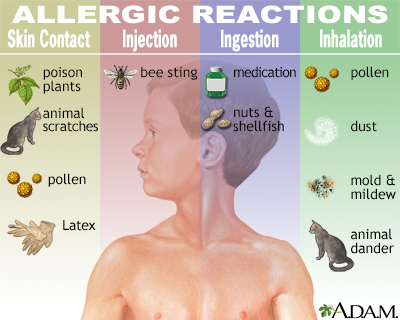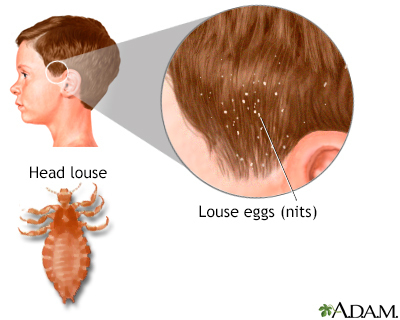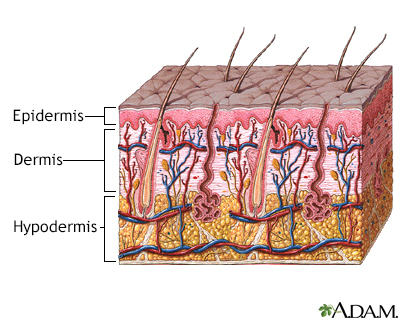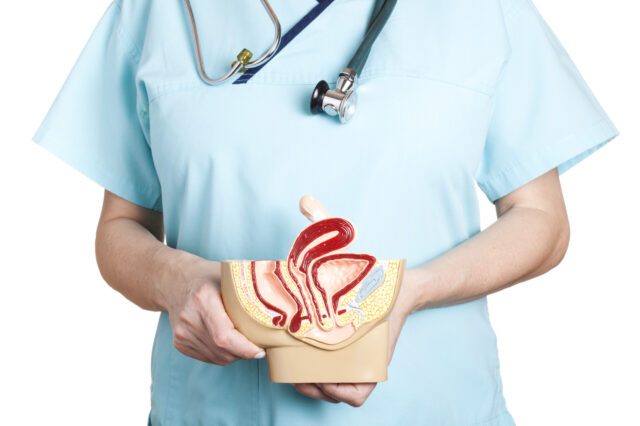Definition
Itching is a tingling or irritation of the skin that makes you want to scratch the area. Itching may occur all over the body or only in one location.
Causes
There are many causes of itching, including:
- Aging skin
- Atopic dermatitis (eczema)
- Contact dermatitis (poison ivy or poison oak)
- Contact irritants (such as soaps, chemicals, or wool)
- Dry skin
- Hives
- Insect bites and stings
- Parasites such as pinworm, body lice, head lice, and pubic lice
- Pityriasis rosea
- Psoriasis
- Rashes (may or may not itch)
- Seborrheic dermatitis
- Sunburn
- Superficial skin infections such as folliculitis and impetigo
Generalized itching may be caused by:
- Allergic reactions
- Childhood infections (such as chickenpox or measles)
- Hepatitis
- Iron deficiency anemia
- Kidney disease
- Liver disease with jaundice
- Pregnancy
- Reactions to medicines and substances such as antibiotics (penicillin, sulfonamides), gold, griseofulvin, isoniazid, opiates, phenothiazines, or vitamin A
Home Care
For itching that does not go away or is severe, see your health care provider.
In the meantime, you can take steps to help deal with the itch:
- Do not scratch or rub the itchy areas. Keep fingernails short to avoid damaging the skin from scratching. Family members or friends may be able to help by calling attention to your scratching.
- Wear cool, light, loose bedclothes. Avoid wearing rough clothing, such as wool, over an itchy area.
- Take lukewarm baths using little soap and rinse thoroughly. Try a skin-soothing oatmeal or cornstarch bath.
- Apply a soothing lotion after bathing to soften and cool the skin.
- Use moisturizer on the skin, especially in the dry winter months. Dry skin is a common cause of itching.
- Apply cold compresses to an itchy area.
- Avoid prolonged exposure to excessive heat and humidity.
- Do activities that distract you from the itching during the day and make you tired enough to sleep at night.
- Try over-the-counter oral antihistamines such as diphenhydramine (Benadryl). Be aware of possible side effects such as drowsiness.
- Try over-the-counter hydrocortisone cream on itchy areas.
When to Contact a Medical Professional
Contact your provider if you have itching that:
- Is severe
- Does not go away
- Cannot be easily explained
Also contact your provider if you have other, unexplained symptoms.
With most itching, you do not need to see a provider. Look for an obvious cause of itching at home.
It is sometimes easy for a parent to find the cause of a child's itching. Looking closely at the skin will help you identify any bites, stings, rashes, dry skin, or irritation.
Have the itching checked out as soon as possible if it keeps returning and does not have a clear cause, you have itching all over your body, or you have hives that keep returning. Unexplained itching may be a symptom of a disease that could be serious.
What to Expect at Your Office Visit
Your provider will examine you. You'll also be asked about the itching. Questions may include when it began, how long it has lasted, and whether you have it all the time or only at certain times. You may also be asked about medicines you take, whether you have allergies, or if you have been ill recently.
References
Dinulos JGH. Urticaria, angioedema, and pruritus. In: Dinulos JGH, ed. Habif's Clinical Dermatology. 7th ed. Philadelphia, PA: Elsevier; 2021:chap 6.
Legat FJ, Weisshaar E, Fleischer AB, Bernhard JD, Cropley TG. Pruritus and dysesthesia. In: Bolognia JL, Schaffer JV, Cerroni L, eds. Dermatology. Philadelphia, PA: Elsevier; 2018:chap 6.




